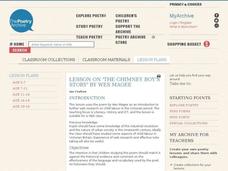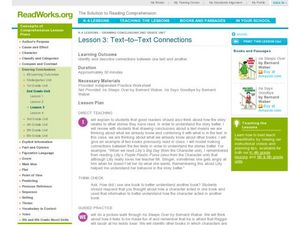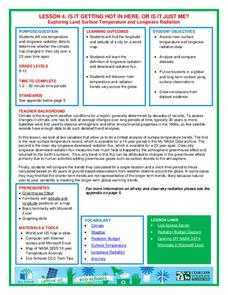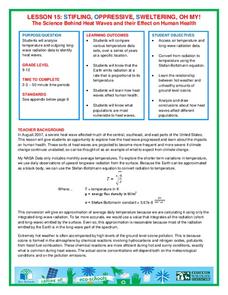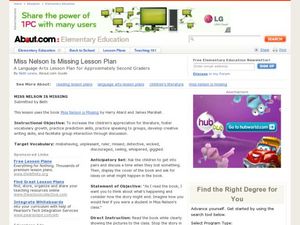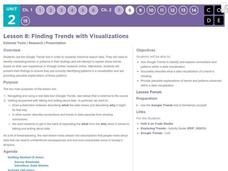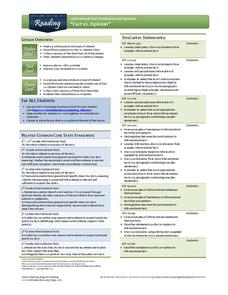Curated OER
Analyzing Literature via Literature Circles
Introduce literature circles with Roland Smith's novels. Your seventh graders will see the activity modeled as you read The Three Little Pigs together and apply the format to a Roland Smith novel of their choice. The lesson includes...
Curated OER
Lesson on 'The Chimney Boy's Story' by Wes Magee
Wes Magee's poem "The Chimney Boy's Story" about chimney sweeps/climbing boys is used as an introduction to a lesson that asks groups to research child labor in Victorian Britain.
Curated OER
Text-to-Text Connections
Help youngsters make connections between two different texts. They read two stories about the same character, Ira Sleeps Over and Ira Says Goodbye. They discuss how the character of Ira acts in each of the stories, how he is the same or...
Curated OER
Text Clues and Background Knowledge
Teach youngsters how to evaluate background knowledge, pictures, and context clues to draw a reasonable conclusion about a story. They practice using the discussed clues as they read the story, Alexander and the Terrible, Horrible, No...
Discovery Education
Sonar & Echolocation
A well-designed, comprehensive, and attractive slide show supports direct instruction on how sonar and echolocation work. Contained within the slides are links to interactive websites and instructions for using apps on a mobile device to...
Curated OER
Data and Probability: What is the Best Snack?
In this math/nutrition lesson, the nutritional value of 3 snack foods is recorded on a data chart and represented on a bar graph. Students analyze and compare information, construct data charts and related bar graphs, and draw...
National Wildlife Federation
Is It Getting Hot in Here, or Is It Just Me?
Currently, only 2.1% of global warming is felt on continents, while over 93% is felt in the oceans. The fourth lesson in the series of 21 on global warming is composed of three activities that build off one another. In the first...
Curated OER
Mathemafish Population
It's shark week! In this problem, young mathematically minded marine biologists need to study the fish population by analyzing data over time. The emphasis is on understanding the average rate of change of the population and drawing...
National Wildlife Federation
Why All The Wiggling on the Way Up?
Some of the CO2 emitted by burning fossil fuels is removed from the atmosphere by natural sinks, such as the ocean. The fifth engaging lesson in the series of 21 examines the CO2 data from three very different locations. It then makes a...
National Wildlife Federation
Stifling, Oppressive, Sweltering, Oh My!
Looking for a hot date? Pick any day in August, statistically the hottest month in the United States. The 15th lesson in the series of 21 instructs pupils to investigate the August 2007 heat wave through NASA data, daily temperature...
National Wildlife Federation
When It Rains It Pours More Drought and More Heavy Rainfall
Which is worse — drought or flooding? Neither is helpful to the environment, and both are increasing due to climate change. The 16th instructional activity in a series of 21 covers the average precipitation trends for two different...
National Wildlife Federation
I’ve Got the POWER! Solar Energy Potential at Your School
Should every school have solar panels? The 19th lesson in a series of 21 has scholars research the feasibility of using solar panels at their school. They begin by gathering data on the solar energy in the area before estimating the...
Kenan Fellows
Sensors in Chemistry
The Environmental Protection Agency monitors sensors to track air pollution and set clean air standards. Enthusiastic young scientists use similar sensors to gather data in their area and then apply the gas laws and conservation of...
Curated OER
2.3.8 Conclusions and Further Research
Students are able to identify the components of the Conclusions and Further Research sections of the project and technical paper. They are able to identify the components of the Conclusions and Further Research sections of the project...
Curated OER
Conjectures and Conclusions
Students draw conclusions and make conjectures given a specific scenario. In this geometry lesson, students model real life scenarios using properties of triangles. They model number facts and explain why the outcome is what it is.
Curated OER
Exploring Similarity Using Scale Drawings
Learners explore scale factor as they create a scale drawing of a box, then determine the surface area and volume of the original and the scale drawing. The one page worksheet contains activities and procedures with four questions.
Curated OER
Miss Nelson is Missing Lesson Plan
Second graders listen to the story Miss Nelson is Missing by Harry Allard and James Marshall. In this literature lesson, 2nd graders predict the story's ending with drawings and discussions within groups.
Midland Independent School District
Drama
Ten drama lessons are the perfect addition to your language arts or theater class. With a focus on script elements, plot development, and parts of a dramatic story, the lessons guide young playwrights through the steps of telling a story...
G. Turrell
Science Activity 1: Light & Sound
Are you looking for lab sheets to go with your class experiment on plant response to light? You are no longer in the dark! This is a lesson that was written for a unit on light, but could easily be used to demonstrate plant behaviors in...
Code.org
Finding Trends with Visualizations
Pupils often hear about trends, but they don't always see them. The eighth lesson in a unit of 15 requires individuals to use the Google Trends tool. Class members identify patterns in the visualization before presenting the patterns...
Virginia Department of Education
Logic and Conditional Statements
If there is a conditional statement, then there is a hypothesis and conclusion. Pupils learn how to identify the parts of conditional statements. Class members continue to work with conditional statements and rewrite them in their many...
Huntington Library
Everyday Life - Exploring the California Missions
Young scholars relive history as they examine primary sources that document everyday life in the California missions. During a class viewing of the included slideshow presentation, children analyze documents, paintings, and drawings in...
For the Teachers
Fact vs. Opinion
Many informational texts are written as factual, but can your learners determine when an opinion is presented as fact? Have your kids read several articles on the same topic and record the statements that contain either facts or...
Arizona Department of Education
Area and Perimeter of Regular and Irregular Polygons
Extend young mathematicians' understanding of area with a geometry lesson on trapezoids. Building on their prior knowledge of rectangles and triangles, students learn how to calculate the area of trapezoids and other irregular...



